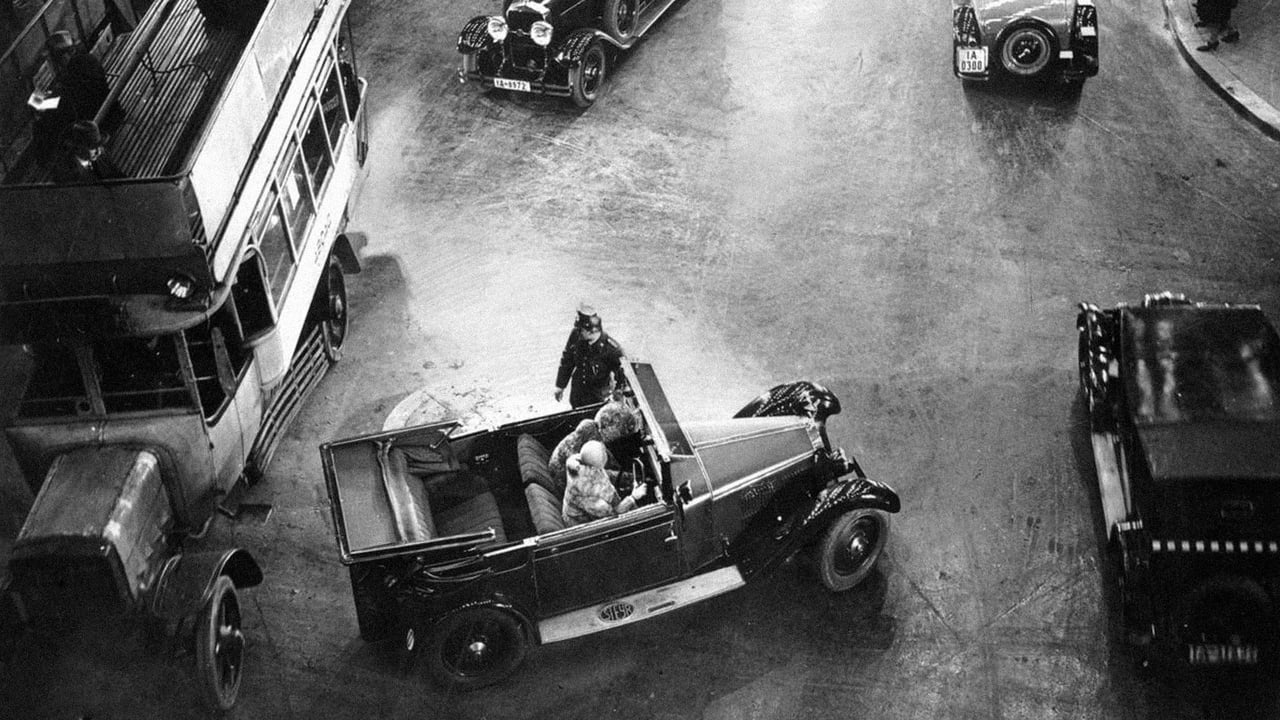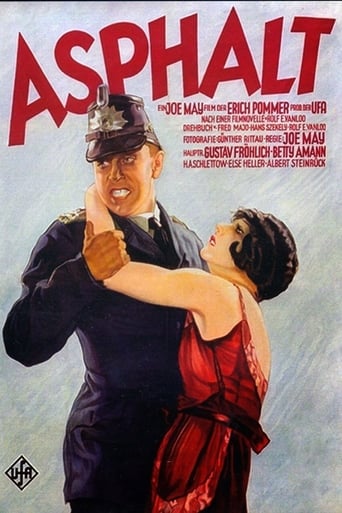Ensofter
Overrated and overhyped
BroadcastChic
Excellent, a Must See
PiraBit
if their story seems completely bonkers, almost like a feverish work of fiction, you ain't heard nothing yet.
Guillelmina
The film's masterful storytelling did its job. The message was clear. No need to overdo.
thinbeach
Its hard to like 'Asphalt' simply because the lead characters are so unlikeable. A policeman who is too weak to stand by his moral compass falls for a seductive jewel thief. The film consists of his attempts to refrain from her seductions, feeling low after his failures, then going back only to fail again. It is fine for half an hour or so (the first half hour is the best), but becomes tedious and quickly loses momentum. It doesn't help that these femme-fatale stories were so overdone already.The most winning aspect of this film is the technical achievements. After a shaky Vertov-esque beginning, it quickly becomes sleek and controlled, very modern. The noir cinematography is typically excellent for the German silents of the time. Despite these virtues however, it is not a story that moves you in any way, except to strong dislike of the characters.
zetes
It's a good film all around, but it's most notable for finding yet another remarkable silent beauty queen, Betty Amann, who could perhaps have been a huge star if the era had continued. With her jet-black bob-cut, she'll remind many of Louise Brooks, but, aside from a similar hairdo, she's not much like Brooks. The story concerns a cop (Metropolis' Gustav Froehlich) who picks up Amann for stealing a diamond from a jewelry store. She tries to seduce him so he'll let her go, but he's so morally upright she basically has to jump on top of him to get what she wants. Froehlich walks away from the situation bewildered, but also kind of in love with her. She, too, develops feelings for the poor little innocent, but odds are against them. Especially when her gangster boyfriend shows back up. I wouldn't quite group this among the silent masterpieces, but it's a fine film. And Amann really is wonderful (she would go on to co-star in Hitchcock's The Rich and the Strange, and she also pops up in Nancy Drew... Reporter). I think it might be a bit better known if not for the lousy title. "Asphalt" only really refers to Froehlich's job as a traffic cop, but I don't see what else it has to do with the film.
Franz
Asphalt (1929) begins stylishly with a city montage sequence and plenty of Germanic-styled subjective point of view shots before giving way to a more subdued, intimate Kammerspiel style. A Clara Bow/Louise Brooks look-a-like (Betty Amann) is shopping for jewelry. The storeowner, entranced by her salacious behavior, does not notice when a handful of diamonds fall to the floor. The woman uses the hollowed out bottom of her umbrella to steal one of the diamonds. She is eventually caught, but pleads poverty, which convinces the shopkeeper not to press charges. However, the arresting officer, played by Gustav Fröhlich, plays by the books and insists on bringing her to the police station. The woman asks if they can go by her apartment for her papers. Once in her apartment the seduction begins full throttle. The entrance into her sexual den is given special treatment with a slow, circular panning shot from the officer's point of view. His resistance is admirable, but not impenetrable. She tries everything, including lying in wait in her bed. When all seems to fail and the officer is about to leave she hops out of the bed and literally jumps into his arms, melting his final resolve with passionate stares and heavy breathing. The theme is a common one in German expressionism: the fall/degeneration of the moral upstanding male at the hands of a woman (Pandora's Box, Blue Angel) or social forces (The Last Laugh, The Last Command, American but Germanic in feel). But May handles it subtly and with an erotic-sexual undertone one finds most strikingly in German cinema of the late twenties (Blue Angel, Pandora's Box, Metropolis, Variety, etc.). The film also reflects social critic Siegfried Kracauer's point on pre-Hitler German cinema about the presence of the weak male figure. The young officer's moral and ethical resolve is broken down by the woman's sexual advances, to the point where he accidentally murders the woman's gangster lover in a fist fight after he returns home to unexpectedly find him there (the murder is shot through a mirror reflection). However, when the policeman returns home and tells his parents, the father, also a policeman, does not hesitate to don his police uniform and arrest his son. In the end, the police officer is exonerated by the woman's guilt of complicity. She is arrested, and the final image sees her walking away along a corridor filmed through a prison-like door. As an historical aside, in an underground scene where city workers lay out asphalt, we see a sinewy camera movement along the ground that foreshadows the similar documentary-like camera movements in Pabst's Kammeradscahft (1931).
Spent Bullets
From its elaborate and stylish opening scenes, Asphalt immediately establishes itself as a startling achievement. This unforgettable film is in many ways the perfect summation of German film-making in the silent era: a dazzling visual style, a psychological approach to its characters, and the ability to take a simple and essentially melodramatic story and turn it into something more complex and inherently cinematic. Although influenced by such classics as The Last Laugh and Berlin: Symphony of a Great City, Asphalt is a unique look at urban life and a classic in its own right.The plot in Asphalt is very simple: a woman caught trying to shoplift a diamond seduces the cop entrusted with bringing her to justice and the cop pays an very high cost for his lapse in judgment, but great films don't require elaborate plots to achieve their greatness. Betty Amann, the female lead who looks like a mash-up of Louise Brooks and Betty Boop, is sensuous and sultry but not cartoonishly so. In other words, she's no Theda Bara and thank goodness for that. Perhaps if she was a cult goddess like Brooks, Asphalt would be no different than the G.W. Pabst classic Pandora's Box. It is completely baffling why Amann never became a star. Amann is paired greatly with Gustav Fröhlich, who is remembered for his performance in Fritz Lang's classic Metropolis, you will be surprised at his range here. Emotionally naked, Fröhlich goes from anger to tenderness, and then to craven denial when faced with the consequences of a violent act.Asphalt is directed by Joe May, a leading German filmmaker of the 1910s and 1920s who is also known for the two-part epic The Indian Tomb. In addition, he helped to launch the career of Fritz Lang. Like Lang, May later relocated to Hollywood, where he directed several classic B-films, most notably The Invisible Man Returns. But Asphalt remains perhaps his most famous, and his greatest, work. However, May's handling of individual scenes is impressive. Reality is put in its place when location shots of the city are followed by a breathtaking Expressionist caricature of what we've just been shown, with the camera craning and tracking through throngs of extras and fleets of vehicles on UFA's enormous street set.As Dave Kehr from the New York Times said, "Asphalt reveals a filmmaker of astonishing technical skills and a distinctive visual style, based on a use of raked sets to create a sense of precariousness and claustrophobia." Brilliant!!!

